AP Psychology unit 1A
1/121
Earn XP
Description and Tags
Name | Mastery | Learn | Test | Matching | Spaced |
|---|
No study sessions yet.
122 Terms
Nature-nurture issue
The long standing controversy relative contributions that genes and experience make to the development of psychological traits and behaviors.
EX: Nature: eye color. nurture: conflict management style
Natural selection
The principle that inherited traits enabling an organism to survive and reproduce in a particular environment will (in competition with other trait variations) most likely be passed on to succeeding generations
EX: Faster fish live, slower fish die and can’t reproduce
Evolutionary Psychology
The study of the evolution of behavior and the mind, using principles of natural selection
EX: May ask, How are we humans alike because of our shared biology and evolutionary history?
Behavior genetics
The study of the relative power and limits of genetic and environmental influences on behavior
EX:May ask, How do we indivually differ because of our differing genes and environments
Mutation
A random error in gene replication that leads to a change
EX: gene that determines eyes sight mutates: glasses
Environment
every nongenetic influence
EX:prenatal nutrition to our experiences of the people and things around us
Heredity
The genetic transfer of characteristics from parents to off spring
EX: Pre-disposal to mental illness
Genes
The biochemical unit of heredity
EX: environmental events “turn on” genes, rather like hot water, enabling a tea bag to express its flavor
genome
The complete instructions for making an organism
EX:what separates human from being tulips or bananas
Identical twins
individuals who developed from a single fertilized egg that split in two, creating two genetically identical organisms
EX:identical twins can be same sex only, fraternal can be same or different sex
Fraternal twins
individuals who developed from two separate fertilized eggs, resulting in genetically unique siblings.
EX: genetically no closer than normal siblings
interaction
the interplay that occurs when the effect of one factor (such as environment) depends on another factor (such as heredity)
EX:go barefoot=develop callouses—neighbor who wears shoes=tenderfoot. The difference between the two of you is an effect of the environment. But it is a product of adaptation
Epigenetics
The study of the molecular mechanisms by which environments can influence genetic expression (without a DNA change)
EX:African butterfly green in the summer and brown in the winter
Nervous system
The bodys speedy electrochemical communication network, consisting of all the nerve cells of the peripheral and central nervous system
EX: communication network takes in information from the world and the body's tissues make decisions and sends back info and orders to the tissue
Central nervous system
The brain and spinal cord (decision makers)
Peripheral nervous system
The sensory and motor neurons that connect the CNS to the rest of the body
EX:responsible for gathering and transmitting CNS decisions
Nerves
Bundled axons that form neural cables, connecting the CNS with muscle, glands and sensory organs
EX:Optic nerve bundles of millions axons into a single cable carrying the messages from the eye to the brain
Sensory (afferent) neurons
Neurons that carry incoming info from the body's tissues and sensory receptor to the brain and spinal cord
Motor (efferent) neurons
Neurons that carry outgoing info from the brain and spinal cord to the muscles and glands
interneurons
Neurons within the brain and spinal cord; they communicate internally and process information between the sensory inputs and motor outputs
EX: a few million sensory neurons and motor neurons but billions of interneurons
somatic nervous system
The division of the peripheral nervous system that controls the body's skeletal muscles
EX: when a friend taps you on the shoulder, your somatic nervous system reports to your brain the current state of your skeletal muscles and carries instructions back, triggering you to your head to turn
autonomic nervous system
The part of the peripheral nervous system that controls the glands and the muscle of the internal organs. its sympathetic division arouses, its parasympathetic division calms
EX: ANS influences glandular activity and heart rate
Sympathetic nervous system
The division of the ANS that arouses the body, mobilizing its energy
EX:Fight or flight response
parasympathetic nervous system
The division of the ANS that calms the body, conserving its energy
EX: rest and digest
Reflexes
A simple, autonomic response to a sensory stimulus
EX: knee-jerk reflex
Neurons
A nerve cell; the basic building block of the nervous system
EX: throughout life, new neurons are born and unused neurons wither away
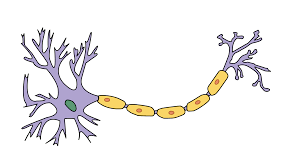
Cell body
The part of a neuron that contains the nucleus; the cells life-support center
Dendrites
A neurons often bushy, branching extensions that receive and integrate messages, conducting impulses toward the
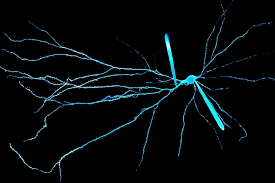
cell body
axon
The segmented neuron extension that passes messages through its branches to other neurons or to muscles or glands
Myelin sheath
A fatty tissue layer segmentally encasing the axons of some neurons; it enables vastly greater transmission speed as neural impulses hop from one node to the next
EX: as myelin is laid down up to age 25, neural efficiency, judgement and self control grow
Glial cells
Cells in the nervous system that support nourish and protect neurons; they may also play a role in learning, thinking and memory
Action potential
A neural impulse; a brief electrical charge travels down the axon
EX: impulse speed can range from 2 miles and hour to 200 miles and hour
Threshold
The level of stimulation required to trigger a neural impulse
EX: thinking of a class vote. If the excitatory people with their hands up outvote the inhibitory people with their hands down, the vote passes
Refractory period
In neural processing, a brief resting pause that occurs after a neuron has fired; subsequent action potentials cannot occur until the axon returns to its resting state
EX: why you can only clap or snap so fast
All or none response
A neuron’s reaction of either firing (with a full strength response) or not firing
EX: triggering a mousetrap with a firmer punch won’t make it snap harder or faster
Synapse
The junction between the axon tip of the dendrite or cell body of the receiving neurons. The tiny gap at this junction is called the synaptic gap
Neurotransmitters
A chemical messenger that crosses the synaptic gap between neurons. When released by the sending neuron, neurotransmitters travel across the synapse and bind to receptor sites on the receiving neuron, thereby influencing whether that neuron will generate a neural impulse
Reuptake
A neurotransmitters reabsorption by sending neurons
EX:some antidepressants partially block the reuptake of mood-enhancing neurotransmitters
Endorphins
“morphine within” ; natural opioid like neurotransmitters linked to pain control and pleasure
EX: explains the “runners high”, the painkilling effect of acupuncture and the indifference to pain in some severe injuries
agonist
a molecule that increases neurotransmitter actions
antagonist
A molecule that inhibits or blocks a neurotransmitters action
EX: curare, a poison blocks receptor sites on muscles producing paralysis
endocrine system
The body’s “slow” chemical communication system; a set of glands and fat tissue that secrete hormones into the blood stream
Hormones
Chemical messengers that are manufactured by the endocrine glands travel through the bloodstream and affect other tissues
depolarization
Positive ions enter the neuron, making it more susceptible to fire an action potential
Polarization
only negative ions in the neuron, making it less suseptable to fire
Psychoactive drugs
a chemical substance that alters the brain causing changes in perceptions and moods
EX:alcohol and nicotine
substance use disorder
a disorder characterized by continued substance use despite resulting life disruption
Depressants
drugs that reduce neural activity and slow body functions
EX:alcohol, barbiurates and opioids
Tolerence
The diminishing effect with regular use of the same dose of a drug, requiring the user to take larger and larger doses before experiencing the drugs effect
EX: when it previously only took one or two drinks to get tipsy for a drinker but now it takes four or five the person has developed a tolerance
Addiction
An everyday term for compulsive substance use (and sometimes for dysfunctional behavior patterns, such as out-of-control gambling that continue despite harmful consequences
Withdrawl
The discomfort and distress that follows discontinuing of an addictive drug or behavior
Barbiturates
Drugs that depress the central nervous system actively reducing anxiety and impairing memory and judgement
EX: nembutal, seconal, and amytal
opioids
opium and it’s derivatives; they depress neural activity , temporarily lessening pain and anxiety
EX: heroin, methadone and cocaine
stimulants
drugs that excite neural activity and speed up body function
EX: caffeine, nicotine and cocaine
Hallucinogens
Psychedelic drugs that distort perceptions and evoke sensory images in the absence of input
EX:LSD, MDMA and weed
Near-death experience
an altered state of consciousness reported after a close brush with death, often similar to drug induced hallucinations
Alcohol
Depressant;
+initial high followed by relaxation and disinhibition
-depression, memory loss, organ damage, and impaired reactions
Heroin
depressant;
+rush of euphoria, relief from pain
- depressed physiology and loss of natural endorphin function
Caffeine
stimulant;
+increased alertness and wakefulness
-anxiety, restlessness, and insomnia in high doses
Cocaine
stimulant;
+rush or euphoria, confidence, energy
-cardiovascular stress, suspiciousness, depressive crash
Hindbrain
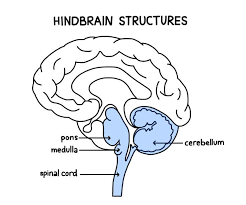
Consists of the medulla, pons, and cerebellum; it directs essential survival functions, such as breathing, sleeping, and wakefulness, as well as coordination and balance
Midbrain
found atop the brain stem; connects the hindbrain with the forebrain, controls some motor movement and transmits auditory and visual information

Forebrain

Consists of the cerebral cortex, thalamus and hypothalamus manages complex cognitive activities, sensory and associative functions and voluntary motor activitie
Brainstem
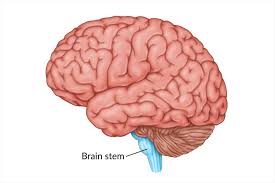
The central core of the brain, beginning where the spinal cord swells as it enters the skull; the brainstem is responsible for automatic survival function
Medulla

the hindbrain structure that is the brainstems base;controls heartbeat and breathing
Thalamus
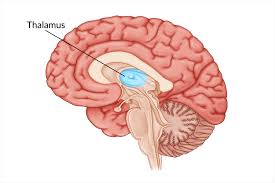
The forebrain’s sensory control center, located on top of the brainstem, directs messages to the sensory recieving areas in the cortex and transmits replies to the cerebellum and medulla
EX: does not receive smell
reticular formation
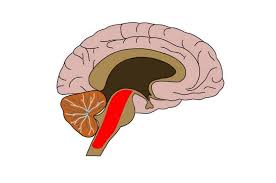
A nerve network that travels through the brainstem into the thalamus; it filters info and plays and important role in controlling arousal
EX: controls alertness. Moruzzi and Horace Magoun discovered in 1949, by electrically stimulating a sleeping cat’s reticular formation, it produced an awake, alert animal
cerebellum
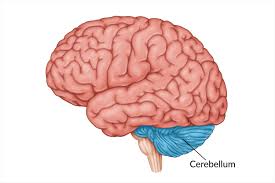
the hindbrain’s “little brain” at the rear of the brainstem it’s functions include processing sensory input, coordinating movement output and balance and enabling nonverbal learning and memory
EX: if your cerebellum is damaged, you would have difficulty walking, keeping you balance or texting a friend
Limbic system

Neural system located mostly in the forebrain below the cerebellum hemispheres; that includes the amygdala, hypothalamus, hippocampus, thalamus and pituitary gland; associated with emotions and drives
EX: can be credited with you enjoying a joke
Amygdala
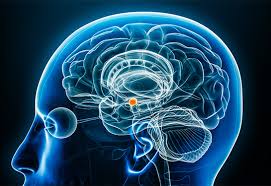
Two lima-sized neural clusters in the limbic system linked to emotion
EX: when a normally I'll-tempered animals amygdala is removed they become more mellow
Hypothalamus

A limbic system neural structure lying below the thalamus, it directs several maintenance activities (eating, drinking, body temperature) helps govern the endocrine system and linked to emotion and reward
EX: a misplaced electrode on a rats hypothalamus revealed reward centers which cause the rat to electrically stimulate itself without researchers aid
Hippocampus
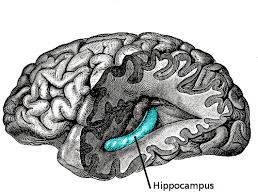
A neural center in the limbic system that helps to process explicit memories of facts and events for storage
EX: those who have survived hippocampus brain tumors in childhood struggle to remember new information in adulthood
Cerebrum
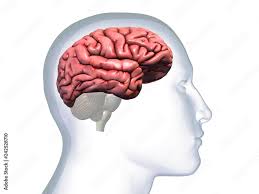
The two cerebral hemispheres that contribute 85% of the brain’s weight. Enables our perceiving, thinking and speaking
cerebral cortex
ther intricate fabric of the interconnected neural cells cover the forebrains cerebral hemispheres; the body's ultimate control and information processing center
EX: scholars who first dissected and labeled the brain used latin and Greek words as graphic descriptions, cortex=bark
Frontal lobes
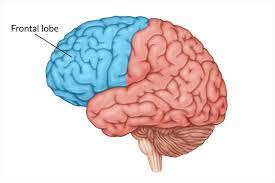
The portion of the cerebral cortex lying just behind the forehead. They enable linguistic processing. muscle movement, higher order thinking and executive functioning (such as making plans and judgement)
Parietal lobes

the portion of the cerebral cortex lying at the top of the head and toward the rear; it received sensory input for touch and body position
Occipital lobes

The portion of the cerebral cortex lying at the back of the head; it includes areas that receive information from the visual fields
Temporal lobes
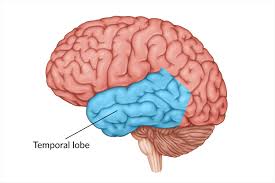
The portion of the cerebral cortex lying roughly above the ear; it includes the auditory areas, each of which receives information primarily from the opposite ear. They also enable language processing
Motor cortex
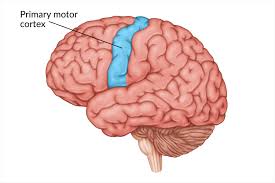
A cerebral cortex area at the rear of the frontal lobes that causes voluntary movement
EX: discovered by finding that mild electric stimulation to parts of an animals cortex made parts if its body move
somatosensory cortex
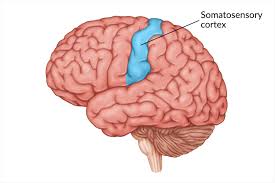
a cerebral cortex area at the front of the parietal lobes that registers and processes body touch and movement sensations
EX: stimulate a point at the top of the band of tissue and a person may report being touched on the shoulder
association areas
areas of the cerebral cortex that are not involved in primary motor or sensory functions, but rather are involved in higher mental functions, such as learning, remembering, thinking and speaking
EX: electrically probing association areas wont produce any observable responses, association areas functions cannot be neatly mapped
prefrontal cortex

forward part of the frontal lobes, enable judgement, planning, social interactions and processing of new memories
neurogenesis
The formation of new neurons
EX: researchers have found baby neurons deep in the brains of adult micem birds, monkeys, and humans
corpus callosum
The large band of neural fibers connecting the two brain hemispheres and carrying messages between them
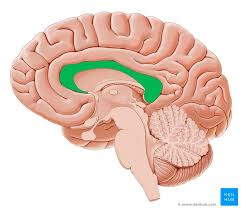
split brain
A condition resulting from surgery that separates the brains two hemispheres by cutting the fibers (mainly those of the corpus callosum) connecting them
EX:those who underwent surgery were surprisingly healthy, with their personality and intellect intact
Biological psychology
The scientific study of the links between biological (genetic,neural, hormonal) and psychological processes
biopsychosocial approach
an integrated approach that incorporates biological, psychological and social-cultural levels of analysis
levels of analysis
the differing complementary views from biological to psychological to social-cultural for analysing any given phenomenon
neuroplacticity
The brains ability to change, especially during childhood by reorganizing, after damage or by building new pathways based on experience
EX: Daniel Kish is able to use echolocation after losing his sight
lesions
Tissue destruction
EX: used in labs to observe different brain functions/injuries
EEG
an amplified recording of the waves of electrical activity sweeping across the brains surface. These waves are measure by electrodes placed on the scalp
MEG
A brain-imaging technique that measure magnetic fields from the brains natural electrical activity
EX: can help researchers to understand how certain tastes influence brain activity
CT scan
A series of x-ray photographs taken from different angles and combined by computer into a composite representation of a slice of the brain’s structure
EX: can reveal damage/injury
PET scan
a technique for detecting brain activity that displays where a radioactive form of glucose goes while the brain performs a given task.
EX: shows most active areas when doing math problem, looking at images of faces or daydreaming
MRI scan
a technique that uses magnetic field and radio waves to produce computer generated images of soft tissue
EX: revealed enlarged ventricles in some people with schizophrenia
fMRI scan
a technique for revealing blood flow and, therefore brain activity by comparing successive MRI scans
EX: as a person looks at a scene, for example, the fMRI machine detects blood rushing to the back of the brain which processes visual information
Excitatory neurotransmitters
A chemical messenger that increases the likelihood of a neuron firing by promoting action potentials
Eugenics
Aimed to promote reproduction among individuals with “desirable” traits and prevent reproduction among those with “undesirable” traits
inhibitory neurotransmitters
chemical messengers that decrease the likelihood of a neuron firing an action potential
Myasthenia Gravis
A chronic autoimmune disorder where the body’s immune system attacks the connection between nerves and muscles, preventing them from communicating properly